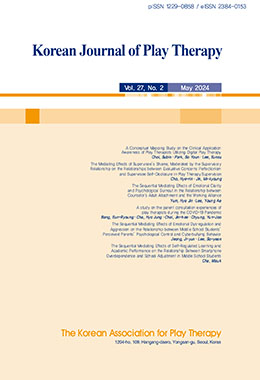본 연구는 놀이치료 수퍼비전에서 수퍼바이지의 평가염려 완벽주의가 자기개방에 미치는 영향에서 수퍼비전 관계 각각의 하위요인(안전기반, 성찰적 교육, 구조화)에 의해 조절된 수치심의 매개 효과를 검증하였다. 이를 위해 전국의 아동상담센터, 병원과 복지관 내 놀이치료실 등에서 근무하고 있으며, 3번 이상의 수퍼비전 경험이 있는 치료자 184명을 대상으로 자료를 수집하였다. ‘평가 염려 완벽주의 척도(FMPS, HMPS, APS-R)’, ‘수퍼바이지 수치심 척도(Shame in Supervision Instrument: SISI)’, ‘수퍼비전 관계 척도(Korean Short Version of Supervisory Relationship Questionnaire: K-S-SRQ)’, ‘자기개방 척도’를 사용하여 자료를 수집하였으며 SPSS 26.0 Program을 사용하여 자료를 분석하였다. 본 연구의 결과를 요약하자면 다음과 같다. 첫째, 연구변인 간의 상관관계가 모두 유의한 것으로 나타났다. 둘째, 수퍼바이지의 평가염려 완벽주의가 자기개방에 미치는 영향에서 수퍼비전 관계의 각 하위요인에 의해 조절된 수치심의 매개효과를 분석한 결과, 안전기반과 구조화의 조절된 매개효과가 유의하였다. 본 연구는 수퍼비전의 질과 치료자의 발달에 중요한 영향을 미치는 수퍼비전에서의 자기개방에 관한 연구를 확장하였다는 데 의미가 있다. 특히 수퍼바이지의 평가 염려 완벽주의 성향이 자기개방에 미치는 부적 영향을 완화하기 위해 보다 지지적이고, 체계적인 수퍼비전이 제공될 필요성을 제시하였다는 의의가 있다.
In this study, the mediating effects of shame moderated by each sub-factor(safe base, reflective education, structure) of the supervisory relationship was verified between supervisee’s evaluative concerns perfectionism and self-disclosure. The subjects of this study were 184 play therapists with more than three supervision experiences, working at children’s counseling centers. Data were collected using the ‘Evaluative Concerns Perfectionism Scale’, ‘Shame in Supervisory Instrument’, ‘Korean Short Version of Supervisory Relationship Questionnaire’, and ‘Self-disclosure Scale’ and were analyzed using the SPSS 26.0 Program. The results of this paper can be summarized as follows. First, the correlations between the main variables of play therapists were all found to be significant. Second, as a result of mediating effect of shame moderated by sub-factors of the supervisory relationship, safe base and structure showed significant moderated mediating effects. This study is meaningful in that it expanded the study on the self-disclosure of supervisee in play therapy supervision. In particular, the necessity of providing a more supportive and systematic provision of supervision was suggested in order to alleviate the negative effect of the supervisee’s evaluative concerns perfectionism on self-disclosure through shame.




